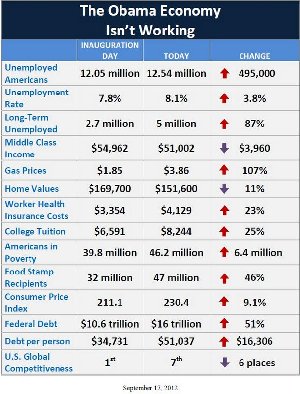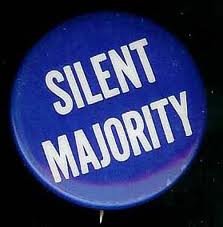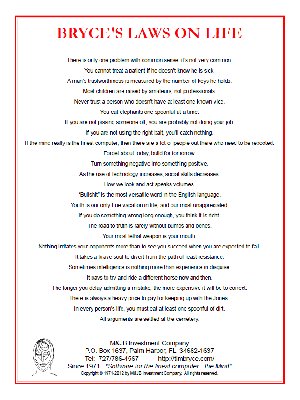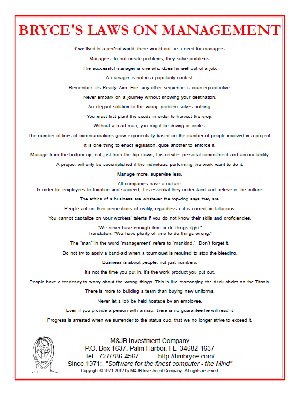- The variables we know about our current president.
 In less than one week we will know who will serve as our president for the next four years. Forget the polls. As I have said all along, this comes down to a few key variables we have to keep in mind when we're in the voting booth:
In less than one week we will know who will serve as our president for the next four years. Forget the polls. As I have said all along, this comes down to a few key variables we have to keep in mind when we're in the voting booth:
THE ECONOMY
It's no secret our economy can be described as lethargic at best. Our Gross Domestic Product (GDP) is at a paltry 1.3% and only reached a high of 4.1% in the last four years. The federal debt is now in excess of $16 trillion ($6.4 trillion added over the last four years), and we're now in excess of 100% of the GDP. Translation: we're spending more than we bring in.
The United States has dropped to #3 in terms of exports (with China and the European Union ahead of us). The balance of International Trade in Goods and Services is now at -$42 billion.
The federal deficit has grown to $1.2 trillion over the last four years and we have been operating without a budget for the last three years which is inexcusable.
Other indicators of economic woes include:
- The country lost its AAA credit rating.
- In 2011 we experienced 1,410,653 bankruptcies (96.61% of which were consumer filings)
- College loan debt now exceeds credit card debt.
- Average gasoline prices have risen $1.85/gallon to $3.86/gallon over the last four years.
- Food stamp recipients have risen from 32 million to 47 million (+46%)
- In 2011 we experienced 1,410,653 bankruptcies (96.61% of which were consumer filings)
- College loan debt now exceeds credit card debt.
- Average gasoline prices have risen $1.85/gallon to $3.86/gallon over the last four years.
- Food stamp recipients have risen from 32 million to 47 million (+46%)
It is rather remarkable the president discarded the report of his own Council of Economic Advisers which basically concluded it was necessary for the government to cut spending.
UNEMPLOYMENT
Despite the president's stimulus/bailout programs, there are still 12.1 million Americans unemployed (officially). Understand this though, another 2.5 million persons marginally attached to the labor force in September had not searched for work in the previous four weeks.
Those worker groups particularly affected include: teenagers (23.7%), blacks (13.4%), and Hispanics (9.9%).
The country experienced 43 continuous months of +8% unemployment. This represents the president's entire term of office, almost.
Interestingly, the president failed to meet with his own Jobs Council for more than six months.
ENERGY
With U.S. oil exploration and drilling slowing to a crawl, Americans questioned why the president would throw the government's weight behind Brazil, a country that also received a $2 billion loan for its state-owned oil company from the U.S. Export-Import Bank. Meanwhile he has turned his back on the Keystone Pipeline which would help the country become more energy independent while creating thousands of much needed jobs for Americans.
The United States still imports over 341 billion barrels of oil, most of which from OPEC and Persian Gulf countries, thereby cementing our dependency on this dangerous part of the world.
While energy costs have nearly doubled as a percentage of the annual family budget, heavy handed regulations from the EPA are making what we pay for energy an even greater burden on our families and our businesses.
The administration's "War on Coal" has forced the industry into retreat, eliminating 1,200 jobs and closing eight mines in Pennsylvania, Virginia and West Virginia. The president has created a regulatory environment that’s aggressively aimed at constraining the use of coal, America’s most abundant, reliable resource.
And there remains no policy or course of action for energy independence, despite having considerable gas, oil, and coal resources in our possession.
IMMIGRATION
It is no secret that 13 million illegals currently reside in the United States costing taxpayers an average amount of $1,117 per household. Efforts by states to stem the flow of illegals has been rebuffed by the federal government in the form of lawsuits against them. Interestingly, a new lawsuit was recently filed by federal immigration agents against Homeland Security for policies they say prevent them from doing their job of defending the Constitution.
Then, of course, there is the failure of "Fast and Furious" which cost the life of Border Patrol Agent Brian Terry, and destroyed the credibility of the president's attorney general, the country's first sitting member of the cabinet to be held in Contempt of Congress for withholding documents related to the scandal.
The attorney general has also been at the forefront of prohibiting states to secure their borders and implement voter identification programs. In addition, he has been an active proponent in implementing the Pretrial System which has jeopardized security by putting criminals back on the streets as opposed to properly processing them through the courts.
FOREIGN POLICY/NATIONAL SECURITY
True, the president is recognized for his approval to eliminate Osama Bin Laden, but the rest of his foreign policy can hardly be called credible. The Muslim Spring led to the rise of the Muslim Brotherhood in the Middle East, not democracy. It also led to our ambassador in Libya being killed and our embassies attacked, which is strongly reminiscent of the Carter administration. No matter how the president tries to spin it, we are still engaged in a "War on Terror."
The Muslim Spring also marked a turning point for the United States as the administration adopted a policy of "leading from behind," whereby we allowed other countries take the lead in determining policy in the Middle East, thus putting into question our country's credibility as a superpower.
Defense has been significantly weakened. For example, we can now only fight in one major arena, not two. This is unlike when we were forced to fight in both the Pacific and Atlantic regions during WW2. There is now a strain in America's relationship with two of its traditional allies, Great Britain and Israel. Should war come again, we may very well find ourselves alone. A recent Pew Research poll reveals the president's approval ratings have dropped considerably among foreign nations, including Muslim countries.
The biggest concern though in foreign policy is our hands-off position regarding the buildup of Iran's nuclear program, a potential powder keg in the making.
UN Agenda 21, which the administration has quietly embraced, is perhaps the biggest threat to the country's freedoms as defined by the U.S. Constitution. This is a program the administration hopes will pass before the people recognize it for what it is, a genuine threat to the American way of life.
In these dangerous times of foreign intrigue, you have to question the wisdom of dodging the presidential intelligence briefings.
SOCIAL REFORM
The president's Obamacare reform is his signature piece of legislation, yet it is still opposed by the majority of Americans. The complexity of the law has had an adverse effect on business who still doesn't understand its ramifications. After it was studied by the Supreme Court, Americans were surprised to learn it represented the largest tax increase in U.S. history.
The president also touted gay rights, not only in terms of marriage, but in the military as well. Meanwhile, the existence of God came under attack.
More disturbing, this administration has fostered the cultivation of a Nanny State whereby freewill is supplanted by the will of the government. This has changed the face of America from "the land of opportunity" to "the land of entitlement."
SO, WHAT IS WRONG WITH THIS PICTURE?
This sounds more like the work of an apprentice learning on the job as opposed to an experienced leader and manager. The next question is, do we stay the course or pick a replacement? Staying the course means you approve of the condition of the country as mentioned herein. True, there are people who will vote by blind devotion along partisan lines, but I would like to believe that voting for a person means you feel they are the most competent to do the job, not because of political ideology. Party politics are nice, but supporting job competency is more important, now more than ever.
Some would argue Governor Romney would not do as well as the president under the circumstances. One thing is clear, he cannot do worse. President Obama's label as an "empty chair" president seems justified or, as I am reminded, "While Nero fiddled, Rome burned."
I don't want to give the impression the president is a complete failure. After all, he did succeed in making Jimmy Carter look like a star.
"If I don’t have this done in three years, then there’s going to be a one-term proposition."
- Barack Obama, February 1, 2009
- Barack Obama, February 1, 2009
Keep the Faith!
Note: All trademarks both marked and unmarked belong to their respective companies.
 Tim Bryce is a writer and the Managing Director of M&JB Investment Company (M&JB) of Palm Harbor, Florida and has over 30 years of experience in the management consulting field. He can be reached at timb001@phmainstreet.com
Tim Bryce is a writer and the Managing Director of M&JB Investment Company (M&JB) of Palm Harbor, Florida and has over 30 years of experience in the management consulting field. He can be reached at timb001@phmainstreet.com
For Tim's columns, see:
timbryce.com
Like the article? TELL A FRIEND.
Copyright © 2012 by Tim Bryce. All rights reserved.
 A few years ago, I was at a Comdex show exhibiting our "PRIDE" Methodologies for IRM and gave a brief overview to an inquisitive attendee. He listened to me patiently, but at the end asked me pointedly what language "PRIDE" was written in. He looked at me dumbfounded when I told him it was written in English. I guess he honestly thought "English" was some new programming language. I could have gone on with the charade and said that it was, but honesty got the better of me and I explained to him our corporate slogan, "Software for the finest computer - the Mind."
A few years ago, I was at a Comdex show exhibiting our "PRIDE" Methodologies for IRM and gave a brief overview to an inquisitive attendee. He listened to me patiently, but at the end asked me pointedly what language "PRIDE" was written in. He looked at me dumbfounded when I told him it was written in English. I guess he honestly thought "English" was some new programming language. I could have gone on with the charade and said that it was, but honesty got the better of me and I explained to him our corporate slogan, "Software for the finest computer - the Mind."
 I was recently stopped at a traffic light on legendary US19 here in Palm Harbor during rush hour. For those of you unfamiliar with US19, it is the main artery running north-south in our county (Pinellas). There are three lanes on each side and traffic volume can be considerable. If you get caught in rush hour traffic, you can be hung-up for quite some time. It can also be quite dangerous; the bumper sticker, "Pray for Me, I drive on US19," pretty much sums it up. There are traffic lights spread approximately three miles apart, which means there is a lot of stop-and-go traffic. So much so, I started to wonder how much time we waste waiting in traffic. To learn the answer, I checked various sources on the Internet and learned more than what I was originally looking for, for example:
I was recently stopped at a traffic light on legendary US19 here in Palm Harbor during rush hour. For those of you unfamiliar with US19, it is the main artery running north-south in our county (Pinellas). There are three lanes on each side and traffic volume can be considerable. If you get caught in rush hour traffic, you can be hung-up for quite some time. It can also be quite dangerous; the bumper sticker, "Pray for Me, I drive on US19," pretty much sums it up. There are traffic lights spread approximately three miles apart, which means there is a lot of stop-and-go traffic. So much so, I started to wonder how much time we waste waiting in traffic. To learn the answer, I checked various sources on the Internet and learned more than what I was originally looking for, for example:
 Today we commemorate an important day in history, namely "Black Thursday," which occurred on October 24, 1929, just 83 years ago.
Today we commemorate an important day in history, namely "Black Thursday," which occurred on October 24, 1929, just 83 years ago.
 Your appearance says a lot, not just about you, but how you regard others as well. Someone who is well dressed and groomed will command more respect than someone who is not. Today, tattoos and body piercings are very popular among younger people. Regardless of your attitude towards them, there are still many prejudices against such body art in the corporate world. Understand this, the higher you go up in the corporate ladder, the more you become a visible symbol of the company you represent. If your body art doesn't convey the right image, you won't be going anywhere. So, if you happen to like that new nose ring you put in, don't expect that big job promotion anytime soon. Like it or not, if you have got body art, do yourself a favor and keep it under cover. The same is true in regards to unkempt hair, facial or otherwise.
Your appearance says a lot, not just about you, but how you regard others as well. Someone who is well dressed and groomed will command more respect than someone who is not. Today, tattoos and body piercings are very popular among younger people. Regardless of your attitude towards them, there are still many prejudices against such body art in the corporate world. Understand this, the higher you go up in the corporate ladder, the more you become a visible symbol of the company you represent. If your body art doesn't convey the right image, you won't be going anywhere. So, if you happen to like that new nose ring you put in, don't expect that big job promotion anytime soon. Like it or not, if you have got body art, do yourself a favor and keep it under cover. The same is true in regards to unkempt hair, facial or otherwise.
 As we have long known, the golden rule for making a profit is to maximize income and minimize expenses. Over the last few years though, government agencies at the federal, state, and local levels have violated this rule primarily by spending more than they take in. Such spending sprees are usually the result of campaign promises made to constituents. Let's face it, it's easier to get elected by giving things away as opposed to practicing fiscal restraint. Thanks to the Great Recession though, we have been given a wake-up call that we can no longer afford such giveaways and must learn to live within our means.
As we have long known, the golden rule for making a profit is to maximize income and minimize expenses. Over the last few years though, government agencies at the federal, state, and local levels have violated this rule primarily by spending more than they take in. Such spending sprees are usually the result of campaign promises made to constituents. Let's face it, it's easier to get elected by giving things away as opposed to practicing fiscal restraint. Thanks to the Great Recession though, we have been given a wake-up call that we can no longer afford such giveaways and must learn to live within our means.
 The hoopla over the party conventions is over, the debates are coming to an end, and we are now just a couple of weeks away from making an epoch decision regarding the direction of our country. If you do not know who you are voting for by now, you have either had your head in the sand, or you simply do not care and will not be voting anyway (thank God). Just about everyone else has made up their mind and is ready to cast their vote. You can be sure both parties are leaving no stone unturned to find any truly undecided voters out there. If they haven't made up their minds by now though, they will undoubtedly be voting for the wrong reasons on election day.
The hoopla over the party conventions is over, the debates are coming to an end, and we are now just a couple of weeks away from making an epoch decision regarding the direction of our country. If you do not know who you are voting for by now, you have either had your head in the sand, or you simply do not care and will not be voting anyway (thank God). Just about everyone else has made up their mind and is ready to cast their vote. You can be sure both parties are leaving no stone unturned to find any truly undecided voters out there. If they haven't made up their minds by now though, they will undoubtedly be voting for the wrong reasons on election day.
 Freemasonry is one of the most misunderstood institutions on the planet. It is not a religion, charity, political action committee or cult. It is simply the original fraternity whereby members congregate to enjoy friendship, morality and brotherly love. Despite this, people are suspicious about their motives and have accused the Masons of everything from starting World War I to the Kennedy assassination. No, they are not trying to secretly commandeer government. Heck, they have trouble organizing a picnic, let alone the world. Now I'm going to let you in on a little secret, but before I do, you should understand in order to join the Masons you must possess a belief in Deity (in a Supreme Being). Because of this, no atheist or agnostic can join the Masons. I have personally sat in Lodge with members representing every religious denomination imaginable, all enjoying peace and tranquility. Now for the secret: discussion about religion and politics is forbidden in a Masonic lodge. This is done in order to maintain the harmony of the Lodge.
Freemasonry is one of the most misunderstood institutions on the planet. It is not a religion, charity, political action committee or cult. It is simply the original fraternity whereby members congregate to enjoy friendship, morality and brotherly love. Despite this, people are suspicious about their motives and have accused the Masons of everything from starting World War I to the Kennedy assassination. No, they are not trying to secretly commandeer government. Heck, they have trouble organizing a picnic, let alone the world. Now I'm going to let you in on a little secret, but before I do, you should understand in order to join the Masons you must possess a belief in Deity (in a Supreme Being). Because of this, no atheist or agnostic can join the Masons. I have personally sat in Lodge with members representing every religious denomination imaginable, all enjoying peace and tranquility. Now for the secret: discussion about religion and politics is forbidden in a Masonic lodge. This is done in order to maintain the harmony of the Lodge.
 For ten years I coached Little League baseball and softball, not to mention being an umpire and serving on the local board of directors. I cannot lay claim to being the greatest coach, nor the worse. I certainly didn't suffer under the illusion this was the big leagues, nor that my kids would go on to play pro ball, even though a handful made it to the college level. Instead, I wanted to teach the mechanics of the game (how it is played), sportsmanship, and the general love of the game. My kids are all grown up now and if I made the slightest impression on them, that I somehow shaped their perspective on the game, than I consider myself lucky. There were only two things I asked of them; that they try their hardest, and maintain their grades in school.
For ten years I coached Little League baseball and softball, not to mention being an umpire and serving on the local board of directors. I cannot lay claim to being the greatest coach, nor the worse. I certainly didn't suffer under the illusion this was the big leagues, nor that my kids would go on to play pro ball, even though a handful made it to the college level. Instead, I wanted to teach the mechanics of the game (how it is played), sportsmanship, and the general love of the game. My kids are all grown up now and if I made the slightest impression on them, that I somehow shaped their perspective on the game, than I consider myself lucky. There were only two things I asked of them; that they try their hardest, and maintain their grades in school.
 Over our country's history, there have been a handful of events which have defined who we are as Americans, such as our Declaration of Independence from Great Britain, our Civil War, our participation in World War II, and the protests of the 1960's. These events defined who we are, our personality as a country, our determination in the face of adversity, and how we treat others as well as ourselves. All have come at a heavy price in terms of human life and the reconstruction of society. Such moments come along rarely and we should be mindful of their effect on our country.
Over our country's history, there have been a handful of events which have defined who we are as Americans, such as our Declaration of Independence from Great Britain, our Civil War, our participation in World War II, and the protests of the 1960's. These events defined who we are, our personality as a country, our determination in the face of adversity, and how we treat others as well as ourselves. All have come at a heavy price in terms of human life and the reconstruction of society. Such moments come along rarely and we should be mindful of their effect on our country.
 I don't know about you but I love it when things go smoothly at work. I enjoy watching a project or assignment execute on-time, within budget and according to specifications. It's a real high. I don't care what the task is, it is always a pleasure watching someone who knows what they are doing and performs it flawlessly. The scope of the project doesn't really matter. It can be complex or mundane, large or small; the fact that it is performed professionally and without a hitch is important to me. I was in awe when I watched Apollo 11 land on the moon and return safely to Earth in 1969. It is the same feeling I have watching a craftsman who goes about his/her work diligently and produces quality work products.
I don't know about you but I love it when things go smoothly at work. I enjoy watching a project or assignment execute on-time, within budget and according to specifications. It's a real high. I don't care what the task is, it is always a pleasure watching someone who knows what they are doing and performs it flawlessly. The scope of the project doesn't really matter. It can be complex or mundane, large or small; the fact that it is performed professionally and without a hitch is important to me. I was in awe when I watched Apollo 11 land on the moon and return safely to Earth in 1969. It is the same feeling I have watching a craftsman who goes about his/her work diligently and produces quality work products.
 Not long ago I ran a series of articles entitled "The Facts About..." which was a four part series providing links on the Internet to research such things as:
Not long ago I ran a series of articles entitled "The Facts About..." which was a four part series providing links on the Internet to research such things as: 

 While we have been preoccupied with presidential politics, the real prize is the U.S. Senate which is currently in the hands of the Democrats. The House will undoubtedly stay in the hands of the GOP, but should the Republicans take over both houses of Congress, they will be in a better position to pass legislation to move the country forward again. Back in February, I wrote a column entitled,
While we have been preoccupied with presidential politics, the real prize is the U.S. Senate which is currently in the hands of the Democrats. The House will undoubtedly stay in the hands of the GOP, but should the Republicans take over both houses of Congress, they will be in a better position to pass legislation to move the country forward again. Back in February, I wrote a column entitled,